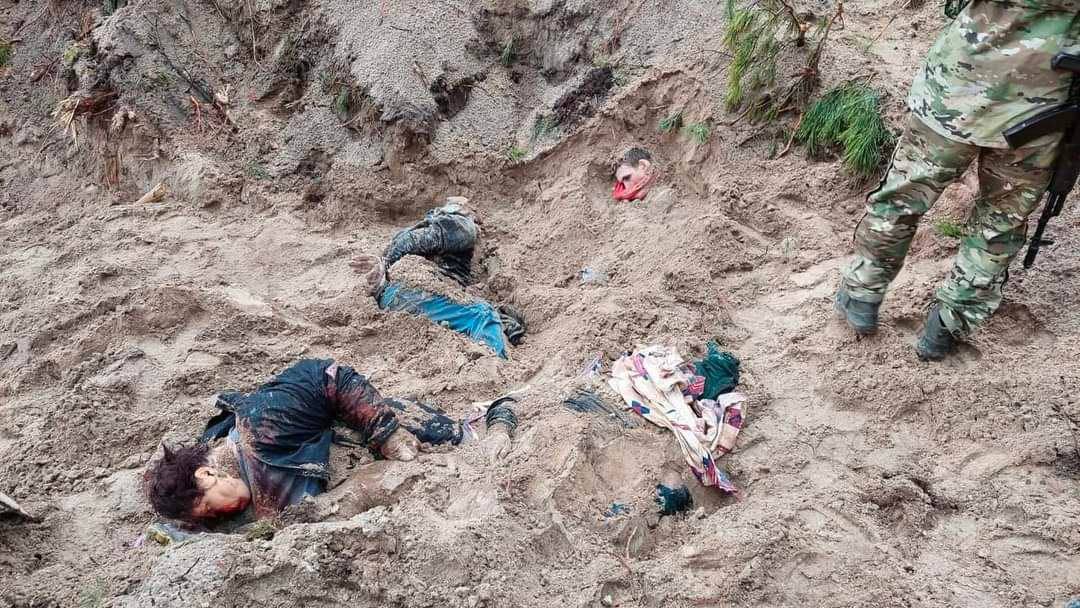A bipartisan group of US House Representatives has reintroduced a resolution calling for Russia's actions in Ukraine to be recognized as genocide. The resolution marks the first Ukraine-related legislative act of the 119th Congress.
The allegations of genocide against Ukrainians by Russian forces are rooted in systematic patterns of violence, targeted killings, and cultural erasure, with evidence emerging, for example, from places like Bucha and Mariupol, where Russian troops executed civilians en masse.
The document, co-sponsored by Helsinki Commission Co-Chairs and Congressional Ukrainian Caucus leaders, argues that Russian military activities in Ukraine meet the criteria for genocide as defined in Article II of the 1948 UN Convention on the Prevention and Punishment of the Crime of Genocide.
Evidence of Russian genocide in Ukraine
The resolution outlines five specific categories of evidence that align with the Convention's criteria.
First, it documents the systematic killing of civilians, including targeted attacks on residential areas and public infrastructure. Official records show 13,729 civilian casualties and 26,706 injuries, including 596 children killed and 1,728 injured. Ukraine documented damage to over 158,434 residential buildings and thousands of civilian infrastructure facilities.
Second, it cites "widespread and systematic sexual violence" against civilians and deliberate strikes on evacuation corridors. Ukrainian authorities have registered 331 cases of conflict-related sexual violence.
The third category details actions creating life-threatening conditions, including the destruction of essential infrastructure, farmland mining, and blocking humanitarian aid.
Fourth, the resolution points to "direct targeting of maternity hospitals" and measures that impede childrearing conditions.
The fifth element addresses the forced transfer of "millions of Ukrainian civilians, hundreds of thousands of whom are children, to Russia or Russian Federation-controlled territories." More than 19,000 Ukrainian children have been identified as forcibly displaced, and 16,000 people are officially listed as missing.
To establish intent, the resolution references official Russian communications, including President Putin's statement claiming Ukraine has "no historical basis" for independence. It also cites a state media article defining "de-Nazification" as "de-Ukrainianization" and notes that soldiers accused of war crimes in Bucha received medals.
The General Prosecutor's Office of Ukraine has documented 170,090 cases related to Russian aggression, with 151,698 classified as war crimes.
This resolution follows a similar initiative presented to the 118th Congress on 24 February 2023.
What should be done?
The resolution calls for three main actions:
- condemning Russia for acts of genocide
- urging the United States to work with NATO and EU allies to prevent further such acts
- supporting international criminal investigations to hold Russian leaders accountable.
The document aims to ensure these actions are reflected in American legislation to enable prosecution and prevent future occurrences.
In June 2024, the Organization for Security and Co-operation in Europe (OSCE) Parliamentary Assembly adopted a resolution recognizing Russia's actions during its full-scale invasion of Ukraine as genocide against the Ukrainian people. The resolution cited evidence of mass civilian murders, systematic torture, and the forcible deportation of up to 19,000 Ukrainian children to Russia, alongside rhetoric and actions aimed at erasing Ukrainian identity.
It called for the decolonization of Russia as essential for lasting peace, urged support for Ukraine's Peace Formula and the Crimean Platform, and recommended establishing a Special Tribunal to hold Russia accountable for its war crimes.
Ukrainian intelligence officials, including Kyrylo Budanov, asserted that Russia had developed a detailed plan for the extermination of Ukrainians well before the invasion began. This included creating execution lists targeting specific groups such as educators, journalists, and political leaders, as well as deploying mobile crematoria and establishing mass graves.
Related:
- Czech Senate unanimously recognizes deportation of Crimean Tatars as genocide
- Crimean Tatar leader says Russia must face justice for war crimes in Ukraine on genocide victims commemoration day
- Budanov says Russia planned genocide in Ukraine in 2022, starting with executions of teachers, journalists, and clergy
- Soldiers of Song: documentary on how Ukraine’s musicians battle Russian “cultural genocide” through music

